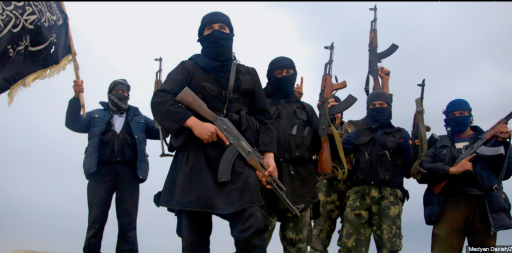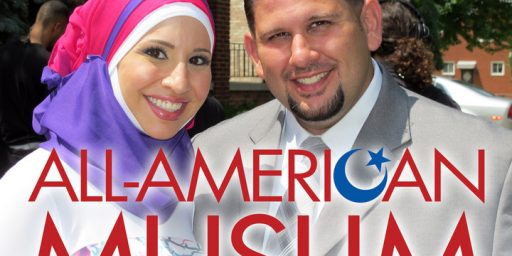The Moor’s Last Laugh
Fouad Ajami has an interesting op-ed in today’s WSJ with that title. The subtitle, “Radical Islam finds a haven in Europe,” gives the initial impression that this is going to be another piece about Europe being soft on terrorists. Instead, it focuses on a rather narrow problem that the U.S. faces as well, although perhaps on a smaller scale:
In the 1980s, terrible civil wars were fought in Arab and Islamic countries–with privilege on one side, militant wrath on the other. The despots and the military caste in Algeria and Tunisia and Syria and Egypt won that struggle. Their defeated opponents took to the road: From Hamburg and London and Copenhagen, the battle was now joined. If accounts were to be settled with rulers back home, the work of subversion would be done from Europe. Muslim Brotherhoods sprouted all over the Continent. There were welfare subsidies in the new surroundings, money, constitutional protections and rules of asylum to fight the old struggle.
“The whole Arab world was dangerous for me. I went to London.” The words are those of an Egyptian Islamist, Yasser Sirri. In London, Sirri runs an Islamic “observation center” and agitates against the despotism of Hosni Mubarak. But Sirri, a man of 40, is wanted back home. Three sentences have been rendered against him in absentia: One condemns him to 25 years of hard labor for smuggling armed terrorists into Egypt; the second to 15 years for aiding Islamic dissidents; and the third to death for plotting to assassinate a prime minister. Sirri had fled Egypt to Yemen. But trouble trailed him there, so he moved to the Sudan, but it was no better. He turned up in London–there, he would have liberties, and the protections of a liberal culture. There would be no extradition for him, no return to the summary justice of Cairo.
Sirri was not working in a vacuum. The geography of Islam–and of the Islamic imagination–has shifted in recent years. The faith has become portable. Muslims who fled their countries brought Islam with them. Men came into bilad al kufr (the lands of unbelief), but a new breed of Islamists radicalized the faith there, in the midst of the kafir (unbeliever).
The new lands were owed scant loyalty, if any, and political-religious radicals savored the space afforded them by Western civil society. But they resented the logic of assimilation. They denied their sisters and daughters the right to mix with “strangers.” You would have thought that the pluralism and tumult of this open European world would spawn a version of the faith to match it. But precisely the opposite happened. In bilad al kufr, the faith became sharpened for battle. We know that life in Hamburg–and the kind of Islam that Hamburg made possible–was decisive in the evolution of Mohammed Atta, who led the “death pilots” of Sept. 11. It was in Hamburg where he conceived a hatred of modernity and of women and of the “McEgypt” that the Mubarak regime had brought into being. And it was in Hamburg, too, that a young “party boy” from a secular family in Lebanon underwent the transformation that would take him from an elite Catholic prep school in Beirut to the controls of a plane on Sept. 11, and its tragic end near the fields of Shanksville, Penn. In its economic deterioration, the Arab world is without cities where young Muslims of different lands can meet. A function that Beirut once provided for an older elite had been undone. European cities now provide that kind of opportunity.
We’ve had a similar situation in the U.S. for decades with diaspora dissident groups, most notably the Cuban exile community. While, on the main, they have integrated quite nicely into American society–and, by virtue of a common religious heritage, had more in common to begin with than Muslims in Europe–there is still a sizable faction of these communities who think of themselves as “Cuban” first and whose primary loyalty and motivation is Cuba rather than their adopted homelands.
Satellite TV has been crucial in the making of this new radicalism. Preachers take to the air, and reach Muslims wherever they are. From the safety of Western cities, they counsel belligerence and inveigh against assimilation. They forbid shaking hands with women examiners at universities. They warn against offering greetings to “infidels” on their religious holidays, or serving in the armies and police of the new lands. “A Muslim has no nationality except his belief,” wrote an intellectual godfather of radical Islamism, the Egyptian Sayyid Qutb, who was executed by Nasser in 1966. While on a visit to Saudi Arabia in 2002, I listened to a caller from Stockholm as he bared his concerns to an immensely popular preacher. He made Qutb’s point: We may carry their nationalities, he said, but we belong to our own religion.
Radical Islamism’s adherents are unapologetic. What is laicite (secularism) to the Muslims in France and their militant leaders? It is but the code of a debauched society that wishes to impose on Islam’s children–its young women in particular–the ways of an infidel culture. What loyalty, at any rate, is owed France? The wrath of France’s Muslim youth in the banlieues (suburbs) is seen as revenge on France for its colonial wars. France colonized Algeria in the 1830s; Algerians, along with Tunisians and Moroccans, return the favor in our own time.
France grants its troubled Muslim suburbs everything and nothing. It leaves them to their own devices, and grants them an unstated power over its foreign policy decisions on Islamic and Middle Eastern matters; but it makes no room for them in the mainstream of its life. Trouble has come even to placid Belgium. In Antwerp, Dyab Abu Jahjah, a young Lebanese, only 32, has stepped forth to “empower” the Muslims of that country. Assimilation, he says, is but “cultural rape.” He came to Belgium in 1991, and he owns up to inventing a story about persecution back home; it was a “low political trick,” he says, and in the nature of things. The constitution of Belgium recognizes Dutch, French, and German as official languages. Abu Jahjah insists that Arabic be added, too.
This is certainly worrisome, although this is another in the rather long list of problems for which there is no obvious palatable solution. Banning political refuges from immigrating would be almost unthinkable and certainly forced assimilation programs would be both barbaric and counterproductive.
For a particularly excellent exposition of this issue, see Yossi Shain, “Multicultural Foreign Policy,†Foreign Policy (Fall 1995), pp. 69-87. I’ve so far been able to find a free copy online.





